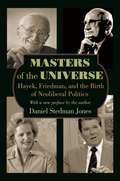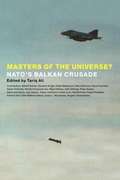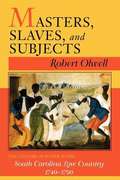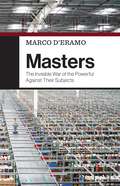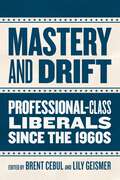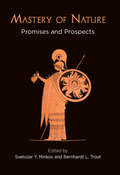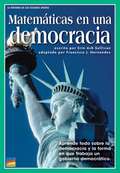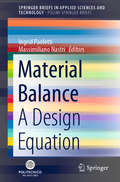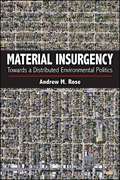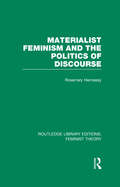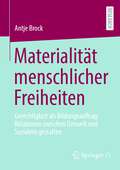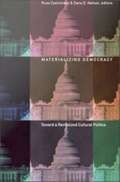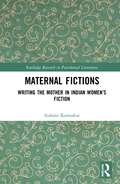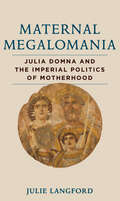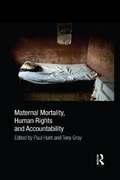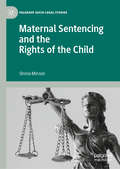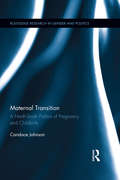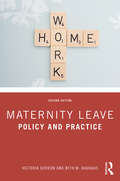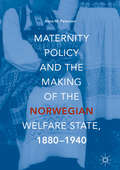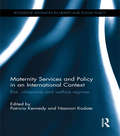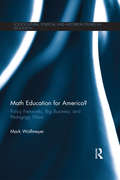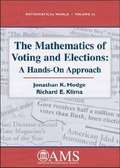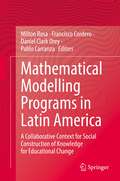- Table View
- List View
Masters of the Universe, Slaves of the Market
by Stephen BellStephen Bell and Andrew Hindmoor compare banking systems in the U.S. and UK to those of Canada and Australia and explain why the system imploded in the former but not the latter. Canadian and Australian banks were able to make profits through traditional lending practices, unlike their competition-driven, risk-taking U.S. and UK counterparts.
Masters of the Universe: Hayek, Friedman, and the Birth of Neoliberal Politics - Updated Edition
by Daniel Stedman JonesHow radical free-market ideas achieved mainstream dominance in postwar America and BritainBased on archival research and interviews with leading participants in the movement, Masters of the Universe traces the ascendancy of neoliberalism from the academy of interwar Europe to supremacy under Reagan and Thatcher and in the decades since. Daniel Stedman Jones argues that there was nothing inevitable about the victory of free-market politics. Far from being the story of the simple triumph of right-wing ideas, the neoliberal breakthrough was contingent on the economic crises of the 1970s and the acceptance of the need for new policies by the political left. This edition includes a new foreword in which the author addresses the relationship between intellectual history and the history of politics and policy.Fascinating, important, and timely, this is a book for anyone who wants to understand the history behind the Anglo-American love affair with the free market, as well as the origins of the current economic crisis.
Masters of the Universe: NATO's Balkan Crusade
by Tariq AliNATO’s war on Yugoslavia in the spring of 1999 was unleashed in the name of democracy and human rights. This view was challenged by the world’s three largest countries, India, China and Russia, who saw the bombing of Serbia and Kosovo as a naked attempt to assert US dominance in an unstable world. In the West, media networks were joined by substantial sectors of left/liberal opinion in supporting the war. Nonetheless, a wide variety of figures emerged to challenge the prevailing consensus. Their work, gathered here for the first time, forms a collection of key statements and anti-war writings from some of democracy’s most eloquent dissidents—Noam Chomsky, Harold Pinter, Edward Said and many others—who provide carefully researched examinations of the real motives for the US action, dissections and critiques of the ideology of ‘humanitarian warfare’, and chartings of the unnecessary tragedy of a region laid to waste in the pursuance of Great Power politics. This reader presents some of the most important texts on NATO’s Balkan crusade and forms a major intervention in the debate on global geo-political strategy after the Cold War.
Masters, Slaves, And Subjects: The Culture Of Power In The South Carolina Low Country, 1740-1790
by Robert OlwellThe slave societies of the American colonies were quite different from the "Old South" of the early-nineteenth-century United States. In this engaging study of a colonial older South, Robert Olwell analyzes the structures and internal dynamics of a world in which both masters and slaves were also imperial subjects. While slavery was peculiar within a democratic republic, it was an integral and seldom questioned part of the eighteenth-century British empire. Olwell examines the complex relations among masters, slaves, metropolitan institutions, officials, and ideas in the South Carolina low country from the end of the Stono Rebellion through the chaos of the American Revolution. He details the interstices of power and resistance in four key sites of the colonial social order: the criminal law and the slave court; conversion and communion in the established church; market relations and the marketplace; and patriarchy and the plantation great house. Olwell shows how South Carolina's status as a colony influenced the development of slavery and also how the presence of slavery altered English ideas and institutions within a colonial setting. Masters, Slaves, and Subjects is a pathbreaking examination of the workings of American slavery within the context of America's colonial history.
Masters: The Invisible War of the Powerful Against Their Subjects
by Marco D'EramoFrom the breweries of Colorado and the faculties of Harvard to the Nobel Prize ceremonies in Stockholm, Marco D’Eramo guides us through the places where a new war has been thought out, planned and financed. It’s a real war, though it has been fought silently, without us realizing it. Warren Buffett, one of the richest men in the world, said it best: ‘There’s class warfare, all right, but it’s my class, the rich class, that’s making war, and we’re winning’. The revolt from above has affected all fields – not only the economy, but also justice and education. It has twisted our ideas of society, family and ourselves. It has taken advantage of every crisis, whether natural disasters, terrorist attacks, recessions or pandemics. It has used every weapon, from the information revolution to the technology of debt. It has changed the nature of power, from discipline to control. It has learnt from the workers’ struggle, using Gramsci and Lenin against them. Maybe the time has come for us to do the same and to learn from our opponents.
Mastery and Drift: Professional-Class Liberals since the 1960s
by Lily Geismer Brent CebulA revelatory look at modern liberalism’s historical evolution and enduring impact on contemporary politics and society. Since the 1960s, American liberalism and the Democratic Party have been remade along professional class lines, widening liberalism’s impact but narrowing its social and political vision. In Mastery and Drift, historians Brent Cebul and Lily Geismer have assembled a group of scholars to address the formation of “professional-class liberalism” and its central role in remaking electoral politics and the practice of governance. Across subjects as varied as philanthropy, consulting, health care, welfare, race, immigration, economics, and foreign conflicts, the authors examine not only the gaps between liberals’ egalitarian aspirations and their approaches to policymaking but also how the intricacies of contemporary governance have tended to bolster professional-class liberals’ power. The contributors to Mastery and Drift all came of age amid the development of professional-class liberalism, giving them distinctive and important perspectives in understanding its internal limitations and its relationship to neoliberalism and the Right. With never-ending disputes over the meaning of liberalism, the content of its governance, and its relationship to a resurgent Left, now is the time to consider modern liberalism’s place in contemporary American life.
Mastery of Nature: Promises and Prospects
by Svetozar Y. Minkov Bernhardt L. TroutIn the early modern period, thinkers began to suggest that philosophy abjure the ideal of dispassionate contemplation of the natural world in favor of a more practically minded project that aimed to make human beings masters and possessors of nature. Humanity would seize control of its own fate and overthrow the rule by hostile natural or imaginary forces. The gradual spread of liberal democratic government, the Enlightenment, and the rise of technological modernity are to a considerable extent the fruits of this early modern shift in intellectual concern and focus. But these long-term trends have also brought unintended consequences in their wake as the dynamic forces of social reason, historical progress, and the continued recalcitrance of the natural world have combined to disillusion humans of the possibility—even the desirability—of their mastery over nature.The essays in Mastery of Nature constitute an extensive analysis of the fundamental aspects of the human grasp of nature. What is the foundation and motive of the modern project in the first place? What kind of a world did its early advocates hope to bring about? Contributors not only examine the foundational theories espoused by early modern thinkers such as Machiavelli, Bacon, Descartes, and Hobbes but also explore the criticisms and corrections that appeared in the works of Rousseau, Kant, Nietzsche, and Heidegger. Ranging from ancient Greek thought to contemporary quantum mechanics, Mastery of Nature investigates to what extent nature can be conquered to further human ends and to what extent such mastery is compatible with human flourishing.Contributors: Robert C. Bartlett, Mark Blitz, Daniel A. Doneson, Michael A. Gillespie, Ralph Lerner, Paul Ludwig, Harvey C. Mansfield, Arthur Melzer, Svetozar Y. Minkov, Christopher Nadon, Diana J. Schaub, Adam Schulman, Devin Stauffer, Bernhardt L. Trout, Lise van Boxel, Richard Velkley, Stuart D. Warner, Jerry Weinberger.
Material Balance: A Design Equation (SpringerBriefs in Applied Sciences and Technology)
by Ingrid Paoletti Massimiliano NastriThis book argues that we are living in an era of deep mutation, and the anthropocentric model no longer fits our way of living and behaving on Earth. Climate change is upsetting our relationship with nature and the environment, while artificial intelligence scenarios undermine the foundations of human life. As the pressure to re-align based on new modes of living and consuming increases, the first priority should be to address the way we imagine, design, produce and construct our built environment. The highly original book explores how the relation between design technology and material cultures can underpin and drive this change. It discusses the need for a new “material balance” to develop our design practice, not only from an energy and environmental perspective, but also from a physiological, cultural and semantic one, in order to re-balance the impact of material design on society. This publication is an excellent guide to understanding in detail the theoretical framing of several crucial topics in material balance design, from computational knitting to material agency, and from new acoustic ecology to future façade technologies, bio-based design and ultimately non-anthropocentric habitats, offering insights into preferable future scenarios.
Material Insurgency: Towards a Distributed Environmental Politics (SUNY series in New Political Science)
by Andrew M. RoseIn Material Insurgency, Andrew M. Rose examines emerging new materialist and posthuman conceptions of subjectivity and agency and explores their increasing significance for contemporary climate change environmentalism. Working at the intersection of material ecocriticism, posthuman theory, and environmental political theory, Rose critically focuses on the ways social movement organizing might effectively operate within the context of distributed agency. This concept undoes the privileging of rational human actors to suggest agency is better understood as a complex mixture of human and nonhuman forces. Rose explores various representations of distributed agency, from the pipeline politics of the Keystone XL campaign to the speculative literary fiction of Leslie Marmon Silko and Kim Stanley Robinson. Each of these cultural and literary texts provides a window into the possible constitution of a (distributed) environmental politics that does not yet exist and operates as a resource for envisioning environmental actors we cannot necessarily study empirically, because they are still only a prospect, or potential, of our imagination.
Materialist Feminism and the Politics of Discourse (Routledge Library Editions: Feminist Theory)
by Rosemary HennessyMaterialist Feminism and the Politics of Discourse confronts the impasses in materialist feminist work on rethinking ‘woman’ as a discursively constructed subject. The book looks at the problem of examining critically the social dimensions on which theories of discourse are premised: how such theories understand ‘materiality’; the relation between ‘women’s experience’ and feminist politics, and that between history and discourse. Rosemary Hennessy considers the work of Kristeva, Foucault, Laclau and Mouffe, and argues for a materialist feminist re-articulation of discourse as ideology. Concerns over identity and difference are incorporated into a rewriting of materialist feminism's analysis of women's oppression across capitalist and patriarchal structures. In adapting postmodernist theories in this way, Hennessy develops a project of social change, where feminism, while maintaining its specificity, is necessarily aligned with other emancipatory movements.
Materialität menschlicher Freiheiten: Gerechtigkeit als Bildungsauftrag: Relationen zwischen Umwelt und Sozialem gestalten
by Antje BrockEines der großen Ziele, an denen sich allgemeine Bildung ausrichtet, ist Gerechtigkeit. Werden Gerechtigkeitsfragen in Raum (lokal bis global) und Zeit ausgedehnt und soziale Kategorien mit der materiellen Umwelt verbunden, wird das Gebiet der nachhaltigen Entwicklung betreten. Entsprechende „Megatrends“ werden Gesellschaften gegenwärtig und in den nächsten Jahrzehnten herausfordern. So zentral es ist, Menschen durch Bildung in die Lage zu versetzen, die Zukunft auf Basis von Nachhaltigkeitsprinzipien mitzugestalten, so voraussetzungsreich ist diese Aufgabe. Beispielsweise birgt die Ausrichtung daran, tiefe Defizite überwinden zu müssen, emotional-motivationale Gefahren wie die von Hoffnungslosigkeit. Dem kann entgegengewirkt werden durch das Fokussieren auf „Pull-Effekte“ in der Bildung. Hierzu zählen das Gestalten attraktiver Zukünfte oder die Kraft „selbst-transzendierender“ Emotionen.Was gute nachhaltigkeitsbezogene Bildung bedeuten und wie diese trotz verschiedener Herausforderungen gelingen kann, wird hier anhand von theoretischen Perspektiven (u.a. dem capabilities approach, Bildungstheorien, Prozessphilosophie, New Materialism), empirischen Befunden und didaktischen Hinweisen dargestellt.
Materializing Democracy: Toward a Revitalized Cultural Politics
by Russ Castronovo Dana D. NelsonFor the most part, democracy is simply presumed to exist in the United States. It is viewed as a completed project rather than as a goal to be achieved. Fifteen leading scholars challenge that stasis in Materializing Democracy. They aim to reinvigorate the idea of democracy by placing it in the midst of a contentious political and cultural fray, which, the volume's editors argue, is exactly where it belongs. Drawing on literary criticism, cultural studies, history, legal studies, and political theory, the essays collected here highlight competing definitions and practices of democracy--in politics, society, and, indeed, academia. Covering topics ranging from rights discourse to Native American performance, from identity politics to gay marriage, and from rituals of public mourning to the Clinton-Lewinsky affair, the contributors seek to understand the practices, ideas, and material conditions that enable or foreclose democracy's possibilities. Through readings of subjects as diverse as Will Rogers, Alexis de Tocqueville, slave narratives, interactions along the Texas-Mexico border, and liberal arts education, the contributors also explore ways of making democracy available for analysis. Materializing Democracy suggests that attention to disparate narratives is integral to the development of more complex, vibrant versions of democracy. Contributors. Lauren Berlant, Wendy Brown, Chris Castiglia, Russ Castronovo, Joan Dayan, Wai Chee Dimock, Lisa Duggan, Richard R. Flores, Kevin Gaines, Jeffrey C. Goldfarb, Michael Moon, Dana D. Nelson, Christopher Newfield, Donald E. Pease
Maternal Fictions: Writing the Mother in Indian Women’s Fiction (Routledge Research in Postcolonial Literatures)
by Indrani KarmakarThis book constitutes a feminist literary analysis of motherhood as presented in selected Indian women’s fictions across a diverse range of geographical, linguistic, class and caste contexts. Situated at the crossroads of motherhood studies and literary studies, this book offers a rigorous examination of the prosody and politics of motherhood in this corpus. In its five thematically focused chapters, the book scrutinises in depth such key concerns as maternal ambivalence; maternal agency and caste; mother–daughter relationships; motherhood and diaspora; and non-biological motherhood. It attempts to understand the literary ramifications of these issues in order to identify the ways in which fiction writers reconceive of the notion of motherhood and maternal identities from and against multiple perspectives. Another pressing concern is whether these Indian women writers’ visions furnish readers with any different understandings of motherhood as compared to dominant Western feminist discourses. Maternal Fictions advances feminist literary criticism in the specific area of Indian women’s writing and the overarching areas of motherhood and literature by acting as a launchpad into a complex constellation of ideas concerning motherhood. The fictional universe is at once ambivalent, diverse, contingent, grounded in a specific location, and yet well placed to converse with discourses emanating from other times and places.
Maternal Megalomania: Julia Domna and the Imperial Politics of Motherhood
by Julie LangfordHow the maternal image of the empress Julia Domna helped the Roman empire rule.Ancient authors emphasize dramatic moments in the life of Julia Domna, wife of Roman emperor Septimius Severus (193–211). They accuse her of ambition unforgivable in a woman, of instigating civil war to place her sons on the throne, and of resorting to incest to maintain her hold on power. In imperial propaganda, however, Julia Domna was honored with unprecedented titles that celebrated her maternity, whether it was in the role of mother to her two sons (both future emperors) or as the metaphorical mother to the empire. Imperial propaganda even equated her to the great mother goddess, Cybele, endowing her with a public prominence well beyond that of earlier imperial women. Her visage could be found gracing everything from state-commissioned art to privately owned ivory dolls. In Maternal Megalomania, Julie Langford unmasks the maternal titles and honors of Julia Domna as a campaign on the part of the administration to garner support for Severus and his sons. Langford looks to numismatic, literary, and archaeological evidence to reconstruct the propaganda surrounding the empress. She explores how her image was tailored toward different populations, including the military, the Senate, and the people of Rome, and how these populations responded to propaganda about the empress. She employs Julia Domna as a case study to explore the creation of ideology between the emperor and its subjects.
Maternal Mortality, Human Rights and Accountability
by Tony Gray Paul HuntThe scale of maternal mortality and morbidity today is staggering. This book focuses on a vital part of a human rights response to maternal mortality, viz. accountability. Accountability encompasses monitoring, review and redress at the local, national and international levels. The book's context includes the UN Human Rights Council maternal mortality and morbidity resolutions, as well as Millennium Development Goal 5. It comes out of a roundtable conference held in Geneva during 2010 that examined maternal mortality, human rights and accountability and provided a forum where maternal health and human rights experts could listen to, and learn from, each other. As well as revised and updated conference papers, this volume includes a rich collection of additional resource material on maternal mortality, human rights and accountability.
Maternal Sentencing and the Rights of the Child (Palgrave Socio-Legal Studies)
by Shona MinsonThis book brings to life the experiences of children affected by maternal imprisonment, and provides unique, in-depth analysis of judicial thinking on this issue. It explores the experiences of children whose mothers are sentenced to imprisonment in England and Wales and contrasts their state-sanctioned separation from their mothers in the criminal courts (where the court may not even be aware of the existence of a child) to the state-sanctioned separation of children from their parents in the family courts, where the child has legal representation and their best interests are the court’s paramount consideration. Drawing on detailed empirical research with children, caregivers, and Crown Court judiciary, Maternal Sentencing and the Rights of the Child brings together relevant literature on law, criminology, and human rights to provide insight into the reasons for the differentiated treatment and its implications for children, their caregivers, and wider society.
Maternal Transition: A North-South Politics of Pregnancy and Childbirth (Routledge Research in Gender and Politics)
by Candace JohnsonWhat are the political dimensions that are revealed in women’s preferences for health care during pregnancy and childbirth? The answers to this question vary from one community to the next, and often from woman to the next, although the trends in the Global North and South are strikingly different. Employing three conceptual frames; medicalization, the public-private distinction, and intersectionality, Candace Johnson examines these differences through the narratives of women in Canada, the United States, Cuba, and Honduras. In Canada and the United States, women from privileged and marginalized social groups demonstrate the differences across the North-South divide, and women in Cuba and Honduras speak to the realities of severely constrained decision-making in developing countries. Each case study includes narratives drawn from in-depth interviews with women who were pregnant or who had recently had children. Johnson argues that women’s expressed preferences in different contexts reveal important details about the inequality that they experience in that context, in addition to as various elements of identity. Both inequality and identity are affected by the ways in which women experience the division between public and private lives – the life of the community and the life of the home and family – as well as the consequences of intersectionality – the combinations of various sources of disadvantage and women’s reactions to these, either in the form of resistance or compliance. The rigorous and highly original cross cultural and comparative research on health, gender, poverty and social context makes Maternal Transition an excellent contribution to global maternal health policy debates.
Maternity Leave: Policy and Practice
by Victoria Gordon Beth M. RauhausWhat does it mean to be a successful working parent? And how do working parents cope in the United States, the only developed nation with no paid parental leave requirement? Despite some positive advancement in the voluntary adoption of paid parental leave, many organizations over the past 25 years have instead decreased paid leave benefits offered to employees in the United States, choosing instead to let unpaid leave under the Family Medical Leave Act (FMLA) serve in its place. This regression in practice is perhaps the greatest unintended consequence of FMLA and surely was not the intent of Congress. Maternity Leave: Policy and Practice, Second Edition approaches parental leave from a variety of perspectives: legal, political, social, institutional, organizational, and, most importantly, from the personal perspectives of the women and men interviewed expressly for the book. This second edition offers two new chapters: the first puts the issue of maternity leave within the context of work–life balance issues, and the second explores case studies from states, cities, and private organizations. Incorporating new census data, related reports, and academic studies, authors Victoria Gordon and Beth M. Rauhaus utilize relevant and cutting-edge research in their exploration of parental leave, and they enrich this research with the individual stories of ordinary working parents as well as those who choose not to have children. Assuming no prior specialized knowledge, this book can be assigned on a variety of undergraduate and graduate courses in politics, public policy, public administration, gender studies, and human resource management, and will equally be of interest to parents, policy makers, and C-suite managers.
Maternity Policy and the Making of the Norwegian Welfare State, 1880-1940
by Anna M. PetersonThis book traces women’s influence on maternity policy in Norway from 1880-1940. Maternity policies, including maternity leave, midwifery services and public assistance for mothers, were some of the first welfare policies enacted in Norway. Feminists, midwives, and working women participated in their creation and helped transform maternity policies from a restriction to a benefit. Situating Norway within the larger European context, the book contributes to discussions of Scandinavian welfare state development and further untangles the relationship between social policy and gender equality.The study of poor, rural women alongside urban middle-class feminists is rooted in an inclusive archival source base that speaks to the interplay between local and national welfare officials and recipients, the development and implementation of laws in diverse settings, the divergent effects maternity policies had on women, and women’s varied response.
Maternity Services and Policy in an International Context: Risk, Citizenship and Welfare Regimes
by Patricia Kennedy Naonori KodateThis book is the first comprehensive international overview of maternity services. Drawing on concepts of risk and social citizenship, it explores the relationship between welfare regimes and health policy by comparing and contrasting provision for childbearing women. Each substantive chapter focuses on a different country, presenting detailed contextual information on health care provision, maternity interventions and birth outcomes there. They discuss key issues such as birth rates and fertility patterns, the role of patient choice, attitudes to place of birth and maternity entitlements among others, and the countries covered represent diverse welfare regimes, including Ireland, Scotland, Sweden, the Netherlands, Germany, Italy, Japan, the United States, Canada, Australia and New Zealand. An extended introduction and a conclusion draw the book together and place it in the context of the literature on comparative welfare regimes. It is an important reference for students and academics interested in comparative social policy, health services research, and maternity services and policies.
Math Education for America?: Policy Networks, Big Business, and Pedagogy Wars (Sociocultural, Political, and Historical Studies in Education)
by Mark WolfmeyerMath Education for America? analyzes math education policy through the social network of individuals and private and public organizations that influence it in the United States. The effort to standardize a national mathematics curriculum for public schools in the U.S. culminated in 2010 when over 40 states adopted the Common Core State Standards for Mathematics. Rather than looking at the text of specific policy documents, this book complements existing critical reviews of the national math education curriculum by employing a unique social network analysis. Breaking new ground in detailing and theorizing the politics of math education, Wolfmeyer argues that the private interests of this network are closely tied to a web of interrelated developments: human capital education policy, debates over traditional and reform pedagogy, the assumed content knowledge deficit of math teachers, and the proliferation of profit-driven educational businesses. By establishing the interconnectedness of these interests with the national math education curriculum, he shows how the purported goals of math education reform are aligned with the prevailing political agendas of this social network rather than the national interest.
Math in FocusTM: The Singapore Approach, Student Book, 3B
by Fong Ho Kheong Chelvi Ramakrishnan Michelle ChooNIMAC-sourced textbook
Math of Voting and Elections: A Hands-on Approach
by Jonathan K. Hodge Richard E. KlimaThis book is devoted to the mathematics of politics and social choice and is a junior /senior level course aimed at students from a variety of mathematical backgrounds.
Mathematical Modelling Programs in Latin America: A Collaborative Context for Social Construction of Knowledge for Educational Change
by Milton Rosa Daniel Clark Orey Francisco Cordero Pablo CarranzaThis book is about the unique, sophisticated, and rigorous study of mathematics in Latin America developed over centuries of cultural exchange between Europe, North, and South America. More specifically, the book explores the tradition of mathematical modelling, introduced a century ago. This modelling was adapted to assist members of distinct communities to draw information about their own realities through the elaboration of representations, which generate mathematical knowledge that deals with creativity and invention. The book provides empirical evidence that a category of mathematical modelling developed in Latin America assesses the horizontal and reciprocal relations between mathematics (school/non-school contexts) and the real world. These relations provide an epistemological and ontological change, where mathematical knowledge of the others is recognized on a horizontal plane. Further, they oblige mathematics teachers and students to understand as a community of knowledge that builds their own mathematical categories of their environment governed by the reciprocal relationships between academic knowledge and functional knowledge. The dimensions of the relationships make up a frame of reference that guides educational change in mathematics. The book presents an inquiry-based approach of three Latin American modelling programs: ethnomodelling, transversality of knowledge, and reasoned decision-making. Each one, with its respective theoretical and methodological foundations related to ethnomathematics and mathematical modelling, socioepistemology, and the attribution of meaning to learning. Undoubtedly, the three mathematical modelling programs, independently, provide educational gains, each with its levels of specificity and loyal to its philosophical, theoretical, and methodological principles. However, the book places them together, organized by axes, to define a corpus of mathematical knowledge that envisions profound educational change through the development of different approaches of mathematical modelling. The authors of the 18 chapters in this book, who represent the diversity of Latin America, are from eight countries: Argentina, Brazil, Chile, Colombia, Costa Rica, Cuba, Ecuador, Honduras, and Mexico. They were invited to share their ideas, perspectives, and discuss investigations that represent a rich sample of three Latin American perspectives on mathematical modelling.

